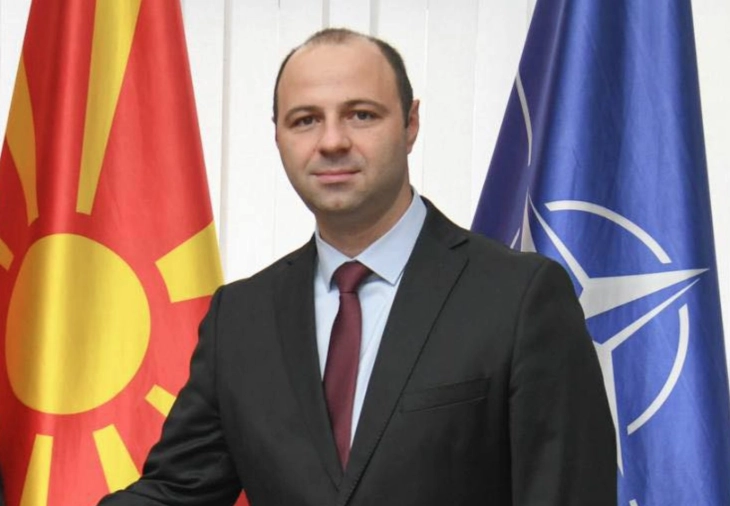Misajlovski attends NATO Defence Ministers meeting in Brussels
- Minister of Defence Vlado Misajlovski is set to attend a meeting of NATO Ministers of Defence in Brussels on Thursday and Friday.

Brussels, 17 October 2024 (MIA) – Minister of Defence Vlado Misajlovski is set to attend a meeting of NATO Ministers of Defence in Brussels on Thursday and Friday.
NATO Defence Ministers are to advance work on deterrence and defence, support to Ukraine and global partnerships.
The Defence Ministers’ meeting will also be an opportunity to exchange views on the current global security situation with NATO’s close partners in the Indo-Pacific and with the European Union. For the first time, Defence Ministers from Australia, Japan, New Zealand and South Korea are joining a NATO Defence Ministers’ meeting. The Ministers will conclude the first day of their meeting at a NATO–Ukraine Council working dinner with Ukrainian President Volodymyr Zelensky and Defence Minister Rustem Umerov, discussing the battlefield situation and Ukraine’s most urgent needs.
At a pre-ministerial press conference on Wednesday, NATO Secretary General Mark Rutte reaffirmed that NATO stands shoulder-to-shoulder with Ukraine, now and into the future. He also noted that work is well on track both to set up the new NATO command in Wiesbaden to coordinate security assistance and training for Ukraine, expecting the command to become fully operational in the coming months.

"On the financial pledge, I am delighted to report that we are firmly on track to delivering the 40 billion pledged for the coming year, as agreed in Washington. I can announce today that NATO Allies committed 20.9 billion euros in military assistance to Ukraine during the first half of 2024. And Allies are on track to meet their commitments for the rest of the year. So the message is clear: NATO is delivering for Ukraine, and we will continue to do so," said Rutte.
According to the NATO Secretary General, Defence Ministers will also review the status of NATO’s current operations and missions in Kosovo and Iraq.
"The situation in the Western Balkans remains concerning. With secessionist threats in Bosnia and Herzegovina, a fragile security situation in Kosovo, and little progress made in the EU-facilitated Belgrade-Pristina dialogue. Russia is also seeking to undermine democracies in the region with cyber and hybrid threats, including disinformation, using internal vulnerabilities to sow divisions," Rutte pointed out.
He added that the growing alignment of authoritarian actors like China, Russia, North Korea and Iran is undermining stability in the Euro-Atlantic and in the Indo-Pacific regions, and in this more interconnected world, it is vital that we tackle our shared security challenges together with global partners.
According to him, the expanded presence at the NATO meeting on Thursday demonstrates the commitment to working with like-minded partners to defend the common values and interests.

"We are particularly looking to increase cooperation in the areas of innovation, supply chains and defence industrial production," the NATO chief added.
Rutte stressed that the Alliance needs to advance work on deterrence and defence in order to meet the growing threats it faces.
"This requires more forces, capabilities and investment to meet the ambitious targets set by our defence plans - expanded defence industrial capacity, more robust supply chains, and leveraging new technologies to ensure that we remain resilient across all domains," said Rutte.
According to him, though progress has been already made across all these lines of effort, more really needs to be done, including the manufacturing of new ships, combat vehicles and jets.
"Defence investments are critical to defending our one billion citizens. They provide the equipment we need to deter and defend. They strengthen our technological edge. And they increase the interoperability of our forces. In other words, there cannot be strong defence without strong defence industry. Achieving this requires increased defence spending, firm orders, and they have to be long term," Rutte noted.
He said he also expects that ministers will greenlight a new NATO initiative to improve standardisation, noting that standards underpin the ability of allies to fight together.

"Better implementation of standards can help reduce costs of defence procurement. So this is essential work for NATO," Rutte underlined.
In addition, the ministerial meeting will see a separate session for the force contributing members of the Global Coalition to Defeat ISIS (D-ISIS), convened by U.S. Secretary of Defense Lloyd Austin.
According to diplomatic sources, more than 30 countries are expected to participate in the session at the minister level, and the focus will be on ways to counter an evolving threat from ISIS in the Middle East and globally.
The sources note that the session and the ministerial show just how united so many countries around the world are on countering a variety of threats, including hybrid, cyber, terrorism, violent extremism, as well as threats to democracies and international rules and norms.
"These types of partnerships, these engagements, help us form the connective tissue that we need to push back against actors who seek to undermine the stability and security that our countries hold dear," the diplomatic sources said.
Photo: MIA archive







